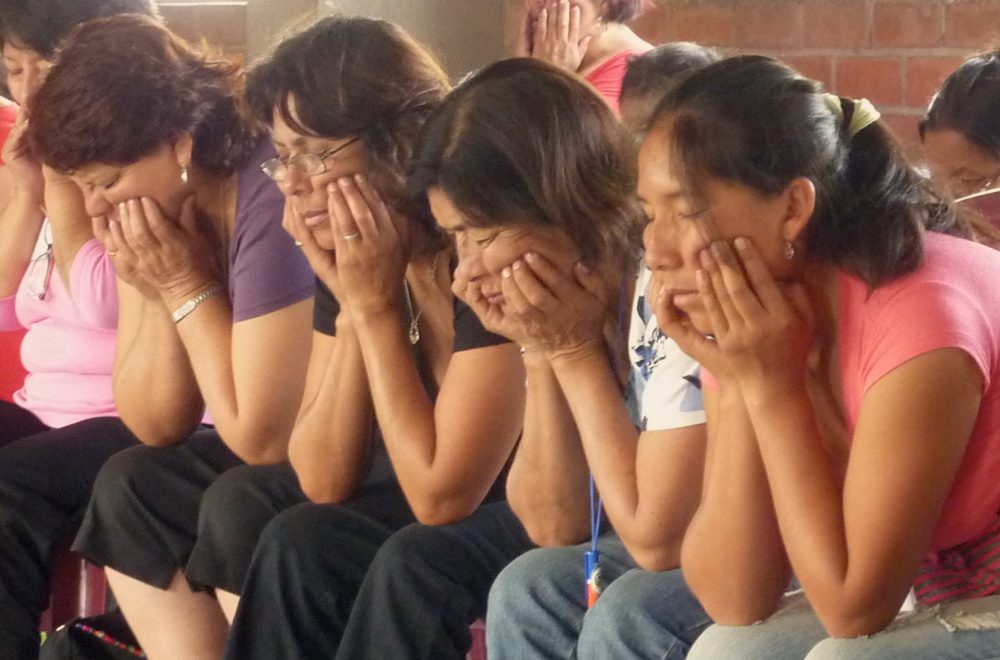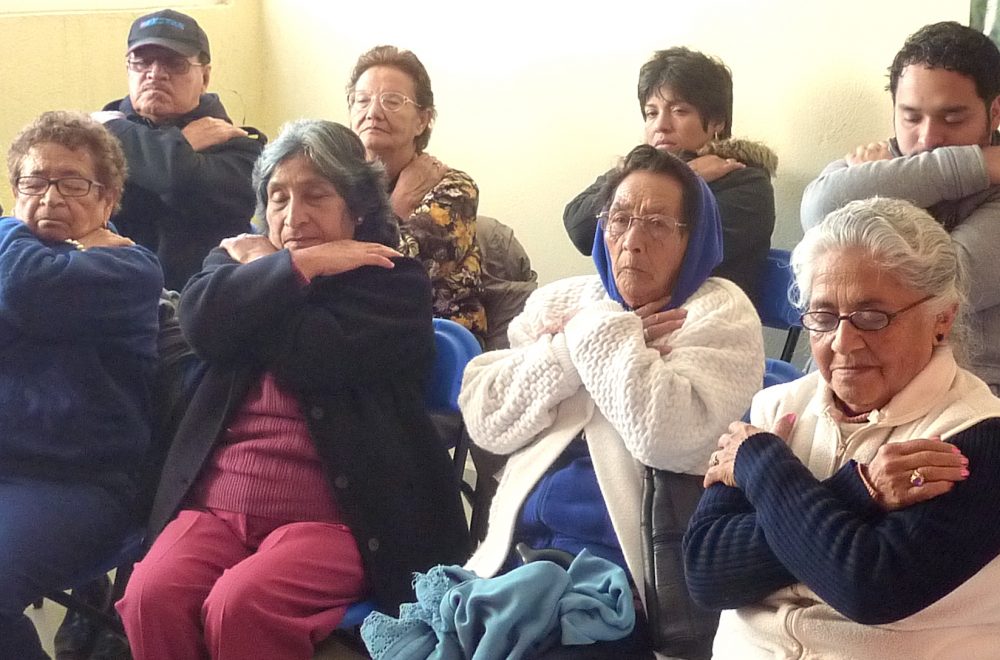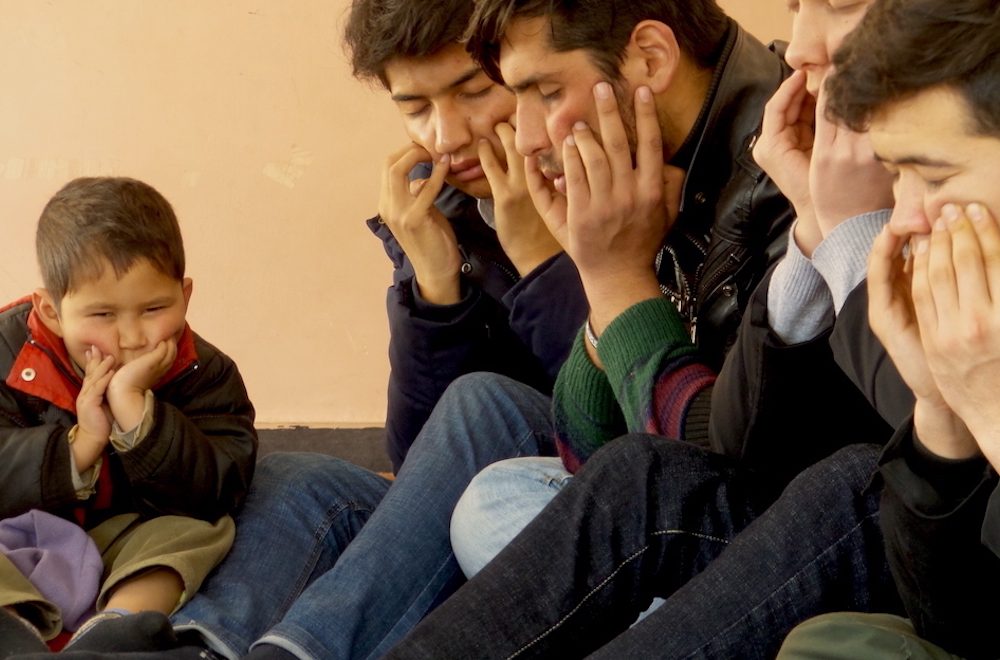Capacitar in Action
Because Capacitar practices tap into body wisdom, they can be adapted and used successfully in the many situations empowering people to heal and find hope no matter their circumstances. The following are some examples of Capacitar in Action.
Refugees / Immigrants
The team of Capacitar en La Frontera works with immigrants and refugees in the ICE detention centers in El Paso and with migrants on the Mexican side of the border. Capacitar has provided training for organizations working with asylum seekers from many countries waiting in Tijuana, Mexico for their court hearings in San Diego. (See the Capacitar Refugee Accompaniment Manual.)
Prison Ministry & Restorative Justice
Los Angeles-based Healing Hearts Restoring Hope integrates Capacitar practices into their work to offer healing to all those affected by homicide. www.hhrh-LA.org
Recovery/Substance Abuse/Shelters
Recovering drug addicts are taught Capacitar practices at Saklay Center in the Philippines to help them deal with the stress of giving up drugs and readjusting to society.
Seniors/Care Facilities
A number of caregivers at the Oakwood Center for retired and aging Catholic sisters share Capacitar practices, such as acupressure and fingerholds, with the women they care for.
Pregnancy and Post Natal
Brónagh Heaney of Capacitar England used different practices throughout her first pregnancy and at the time of labor and delivery. Brónagh and her husband John found that Capacitar practices were helpful for managing stress as new parents.
Capacitar for Nursing Mothers
Ceit Blue of Tucson, Arizona, is an International Board Certified Lactation Consultant and CAPPA Certified Childbirth Educator. Ceit works with medically complex moms and babies, and has been using Capacitar with her patients for several years.
Birth trauma can impact postpartum recovery negatively, which can result in reduced infant/maternal/parental bonding, decreased oxytocin release (resulting in reduced milk supply), and shorter breastfeeding durations. New parents are often sleep deprived, overwhelmed, and greatly challenged to process through birth trauma, as many times they are simultaneously coping with the intensity of newborn care, physical postpartum healing, and any possible trauma they may be experiencing in association with feeding challenges.
In her lactation sessions, Ceit often teaches breathing, Emotional Freedom Tapping, Fingerholds and Imagery/Visualization. For continued accessibility, she includes links to the Capacitar YouTube channel on the patient’s Plan of Care. She is repeatedly seeing positive outcomes, making optimal short and long-term health more sustainable for infants and their parents.
Capacitar in the Neonatal Center
Staff of Integrative Touch for Kids (ITK) in the Neonatal Center at Diamond Children’s Hospital in Tucson, Arizona, apply Capacitar wellness practices to entire families who are coping with a child with cancer, a child with special needs, a child with life-threatening illness or disability, or a premature infant, many weighing less than 3 pounds.
Sharyn Chesser, RN, coordinator of Capacitar in Tucson, described how the ITK team has integrated many of the Capacitar methods in their work to support the health and wellbeing of whole families as they deal with the very stressful issues that arise when a child faces a serious illness. Members of the ITK staff participated in the Tucson training several years ago and have since trained other staff and volunteers as well as doing research on the impact of their work.
Capacitar for Midwives
Midwife Jenny Patterson of Capacitar Scotland recently received her doctorate from Edinburgh Napier University, focusing her dissertation on PTSD-PC (Post Traumatic Stress Disorder-Post Childbirth) using wellness practices for the health of mother and child. Jenny’s findings showed that the self-care and wellbeing of the midwife is crucial for healthy births.
Jenny studied the Quality of Provider Interaction (QPI) as a significant contributing factor in the birth process. Key findings in Jenny’s research included the need for women and midwives to be acknowledged as human and have their needs met, alongside the need to prioritize and protect the woman/midwife relationship.
Jenny has used Capacitar wellness practices in her trainings for midwives, as well as in her workshops for pregnant women. Edinburgh Napier University plans to integrate Capacitar wellness practices for self-care in its mental health, nursing and midwife programs.
Capacitar in Innercity Dublin
Marian Baker, president of Capacitar Ireland, has been working in a violent area of Dublin with small children and youth impacted by murders and inner city violence. Marian works with staffs of a creche for children under 3 years of age and also with a pre-school. At O’Connell’s Boys School, Marian is forming a group of Capacitar leaders, working with boys who were identified by the principal as having emotional difficulties. In the future, the boys will lead Tai Chi and different practices for other classes in the school.
Capacitar in Watts, California
At Presentation Learning Center in Watts, near Los Angeles, a team of ten women coordinated by Jane Bonar and Catherine Burke, PBVM, meet every Wednesday to practice Capacitar methods. Capacitar has been integrated into all aspects of the Learning Center that offers citizenship classes and a variety of skill classes to men and women from Mexico and Central America.
Capacitar for Schools in DR Congo
A valuable new project was started by Sr. Ingrid Janish in 12 primary schools in the Kivu area of DR Congo. Capacitar practices are taught in 8 schools in Goma, in 2 schools in the territory of Rutchuru and in 2 schools in the parish of Masisi. Ingrid says, “All is going very well everywhere and our trainers give their best!”
During the school summer holidays, Ingrid and her team will also organize “holiday games” including Capacitar practices with 80 pupils in Goma, 30 in Rutchuru and 30 in Masisi! “So you can understand that it will be a very busy time for us, but the children are our best Capacitar multipliers!”
The children in all of the schools where Ingrid and her team work have been traumatized by the ongoing violence in the region. The simple Capacitar practices give children tools to calm and stabilize themselves when they have flashbacks, mental confusion or traumatic experiences. And the practices help them to focus and to learn more effectively in the classroom.
Capacitar for Trauma in South African Schools
Teachers in South Africa deal with multiple crises and trauma in the classroom. Now a Trauma Informed Schools (TIS) Initiative has been launched in Cape Town by a government psychological support team for high-risk schools on the violent Cape Flats. Workshops, entitled Circles of Care, include a Teacher Trauma Tool to enable teachers to better deal with stressed and traumatized children.
The trainings are designed and facilitated by Dr Sharon Johnson, a Capacitar trainer in Cape Town for the Western Cape Education Department. “While teachers are informed about the effects of multiple traumas on children, they do not feel adequately equipped to deal with complex issues,” said Sharon. After four 2-hour trainings in brain science and psycho-education, together with body work that included Capacitar Emergency Kit techniques, teachers felt more equipped to deal with learner responses to trauma. Some of the teachers shared their insights: “The class gave me practical ways of how to deal with my learners during a crisis or trauma.” “A calm teacher creates a calm classroom!” “I can look at the realities and after effects of trauma on learners.”
Sharon also demonstrated Capacitar techniques as part of ice-breakers to a group of 500 learners during a WCED talk on cyberbullying. Social media abuse has been recognized as part of the definition of bullying as a trauma for children. Cyberbullying covers a wide range of communication, such as WhatsApp messaging, Instagram, Twitter and emails, and learners are more and more in danger of exposure to exploitation and harm.
Sharon’s latest initiative in schools, partnering with the NGO Gravitree, is in the rural areas of Cape Town, where trauma in schools has been identified as a primary concern in the local communities. Sharon hopes to introduce Circles of Care and Teacher Trauma Tool, with the Capacitar Emergency Kit, in a pilot project later in the year.


